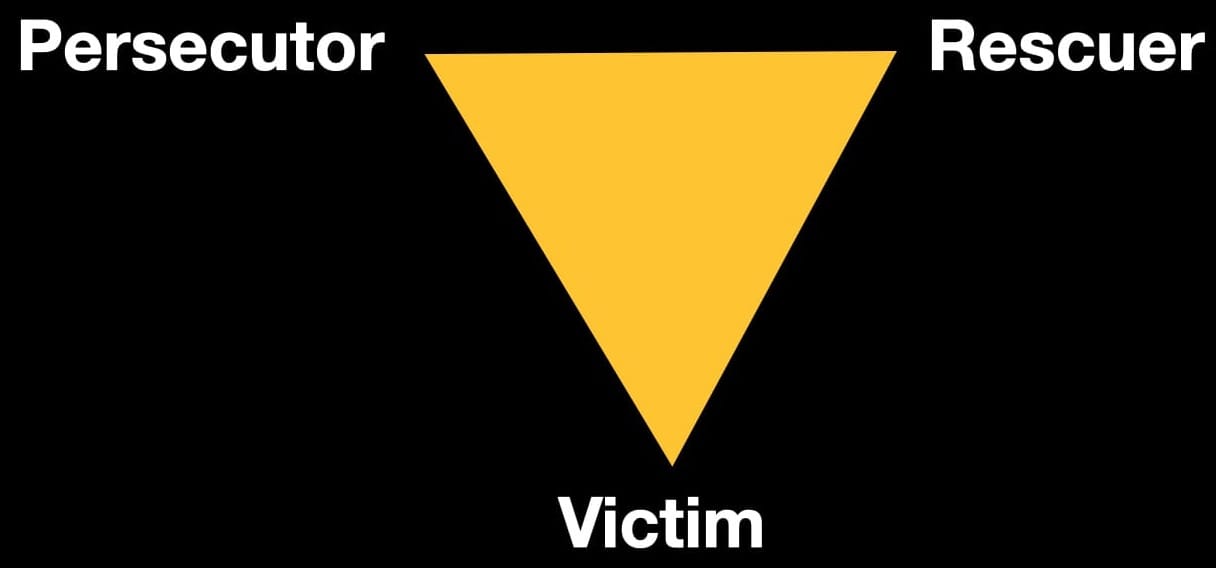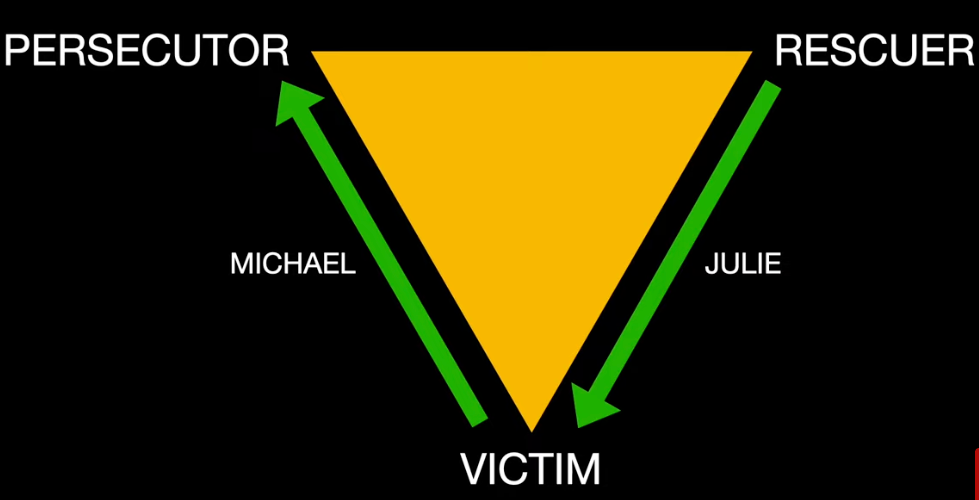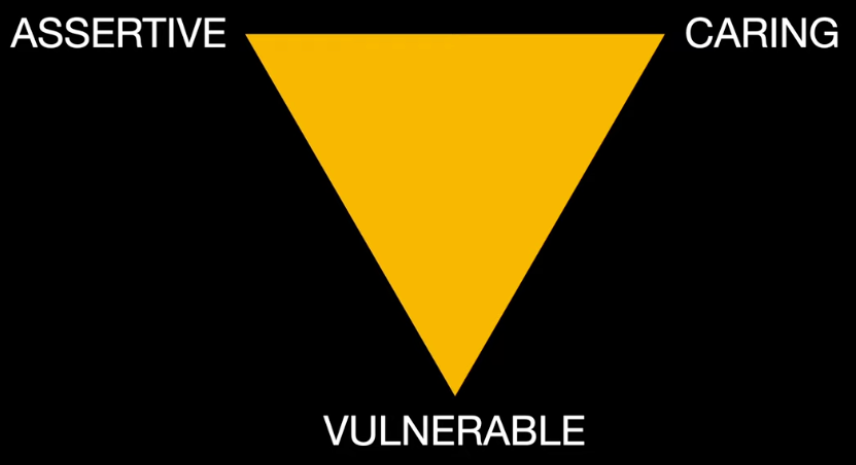
We Are All Drama Queens and Kings
Key Takeaways
- There are three roles in the drama triangle game: Victim - "Poor me," Persecutor - "It's your fault," and the Rescuer - "Let me help you."
- We all play these roles in various conflicts, but depending on our attachment style and childhood history, a person may play one role predominantly during conflicts.
- Each role in the triangle involves a discount: a persecutor discounts the other's sense of worth, the rescuer the other's agency and abilities, and victims discount their ability to think and problem-solve.
- During conflict, one can start out playing one role but then quickly switch to another role. Switching positions is a defining characteristic of the psychological game being played.
- We most often play these games and the roles without awareness we are doing so, especially when we are triggered emotionally.
- Escaping the Drama Triangle involves first being aware of it, seeing what role you most often default to, and learning to avoid the game before it starts.
- Continuing rumination over a conflict is one way to spot that you are playing the game.
- One can get swept up in the game alone, playing it all by yourself in your head.

Here is an example of the drama triangle that involves a mother, father, and their children from the book How To Break Free of the Drama Triangle and Victim Consciousness:
Act One: Dad comes home from work to find his children in the family room watching television and eating snacks. Mom is in the kitchen drinking coffee and reading the newspaper. This domestic scene does not match the expectations that Dad had on his drive home. He fantasized that the house would be quiet. His children would be in their rooms doing homework, and Mom would have dinner prepared and maybe a cold drink waiting for him. When he opens the front door and finds things are not as he fantasized, he assumes the Persecutor role and erupts with a roar, releasing all the feelings of frustration he accumulated because of problems at work. He vents his frustration at the children: “Why aren’t you in your rooms doing your homework? You all know the rules!” The children look up from the television, stunned by Dad’s sharp tone. Feeling Persecuted by Dad, they respond as Victims. “Well, Mom said it was okay for us to watch TV.” Then they look at their Mother for help when she comes into the living room to see what the problem is. She assumes the role of Rescuer when she says to Dad, “The kids were just relaxing after being at school all day!” This marks the end of the first act.
Act Two: Now Mom becomes the Persecutor and attacks Dad. “Why do you have to come home every night and yell at the children?” Father now switches into the Victim role. The children quickly pick up the Rescuer role when they turn off the television and say, “We’re going to our rooms to do our homework.” End of Act Two.
Act Three: Dad becomes the Persecutor when he attacks Mom. “Why in the heck did you let the kids watch TV? And why don’t you have dinner ready? What have you been doing since you got home from work? You knew I’d be hungry!” Mom now switches into the Victim role. Their daughter hears them arguing in the kitchen, and she comes running in to Rescue Mom. “I’ll help you get dinner ready, Mom.”
Act Four: Dad, now sensing that he’s being seen as the bad guy, switches to the Rescuer role by saying, “Why don’t we just order a pizza or something and not worry about getting dinner ready?”
Act 5: Mom, who hasn’t yet played the Victim takes on the Super Victim or Martyr role when she says, “I’m perfectly capable of getting dinner. Besides, it’s too late for pizza. I already defrosted the meat for dinner, and we can’t afford to let it go to waste.”
Act Six: Mom switches into the Persecutor role and Dad to the Victim when she says to him, “All you can think of is something that is going to cost us more money. You don’t ever pitch in a help get dinner ready. You just complain about it not being ready.”
At this point, Dad can shift to either Victim or Super Persecutor. He decides to rage, and explodes into Persecutor so he can vent even more of his feelings. “I’m tired of always being the bad guy. I’m going to go and watch TV. I don’t even want any dinner.” He then withdraws to the family room as the wounded Victim.
Thoughts
In 1968 Dr. Steven Karpman, a psychiatrist in private practice with a clinical appointment at UCSF, published the paper Fairy Tales and Script Drama Analysis in which he first described the Drama Triangle.
The Drama Triangle is a psychological game that surfaces during conflicts between 2 or more people, but just one person can play the game. The game has 3 roles:
Persecutor: in this role, the person puts people down and belittles them with a "this is all your fault" mentality. They criticize and blame, are arrogant, controlling, angry, and generally unpleasant. The persecutor's position makes them feel better than others since, in the persecutor's mind, the others involved in the conflict are not good enough. The persecutor role is a defensive position that allows one to stay one-up on others. I am OK, and you are not OK.
Rescuer: in this role, the person offers help, also from a one-up position. Their implicit belief is that they have to help the other person because they are not capable of helping themselves. Rescuers work hard to help others and often neglect their own needs. Guilt is a common weapon deployed (most often unconsciously) by Rescuers to keep others dependent, and Rescuers often feel guilty if they are not rescuing someone who "needs" help. Once again, I am OK, and you are not OK.
Victim: in this role, the person adopts the mental stance of poor me and "I am not OK." They see themselves as victimized, powerless, and helpless; they do not take responsibility for their negative circumstances, and they deny having the ability to change their circumstances. Victims can control others by manipulating them to feel guilty, and they are especially good at hooking a person into a Rescuer position. Self-pity is a key victim emotion.
Each of the 3 roles involves a discount of the other person involved in the conflict: the Persecutor discounts the other person's sense of worth, the Rescuer discounts the other's ability to think for themselves and act on their own resources, and the Victim discounts their own ability to think and problem solve.
Every Drama Triangle and psychological game goes through 6 stages:

Another example that highlights the stages of the game.
Julie has decided to end her relationship with Eric. When she tells him this, the game begins:
Eric: "Did you ever really love me? Did you ever really care for me?" This is the Con, the bait that hooks Julie into the game. It is a manipulative, potentially guilt-inducing statement made from the role of Victim.
Julie: "Of course I loved and cared for you! You know I did!" The Gimmick is the weak spot or vulnerability (we all have one or more of them!) that makes one buy into the Con. Julie's vulnerability is her unconscious belief (childhood stuff below conscious awareness) that she should always help others, which routinely tilts her into the Rescuer role.
This opens the door to full immersion in the Drama Triangle game. It kicks off with the Response when Michael says, "Then why are you hurting me like this?" (Victim role and attempts to induce guilt), to which Julie responds by saying, "I'm sorry, I never meant to hurt you" (Rescuer). Julie always gets hooked into the Rescuer role because she routinely rescues others to feel valued.
The next step in the game is the Switch, where one suddenly switches roles in the game. The Switch is the defining feature of the Drama Triangle game.
Michael: "Then why are you treating me like trash now?" Michael switched from Victim to Persecutor. Julie: "It's harder for me than for you!" Julie switched from Rescuer to Victim.

The Switch grabs control of the game by creating confusion and surprise, which is the moment of Cross-Over. This leads to the Pay-Off which, believe it or not, are the negative emotions both people experience from playing the Drama Triangle game.
The Switch is usually unconscious, and it reinforces the person's life scripts that were embedded into their brains as a child. For Michael, it is to feel angry because, as a child, he learned to get what he wants (his needs met) by becoming angry. For Julie the Payoff is to feel inadequate, a familiar emotion she experienced frequently as a child.
The Payoff of negative emotions may sound weird - but it returns us, subconsciously, to our deeply embedded ways of coping with conflict that were inculcated during our development that have come to feel "normal" as an adult.
As I reflect back over my years of living, I am stunned to realize how many times I have been hooked into the Drama Triangle. It feels embarrassing to me that I was caught up in this game so often, without any idea of the game I was playing. I grew up with an alcoholic mother and stepfather, and there is no doubt that I played the Rescuer over and over in a futile effort to prevent my mother from getting upset and drinking more.
How To Escape the Drama Triangle
Escaping the lure of the drama triangle can be hard because the games are often subconscious and subtle.
Step 1 is to do what you are doing right now as you read this - increase your awareness of the Drama Triangle and practice spotting these games in yourself and others.
For me, becoming aware of the Drama Triangle falls into the category of Once You See It, You Can't Unsee It - i.e. ignore it at your own peril. When you unwittingly slip into playing the game, you can ignore the fact that you are playing the game, but now you will know you are, and you will know that you could be playing a different and more constructive game.
Step 2 is to ask yourself - "which role in the Drama Triangle do I play the most?" It is usually the one you are most familiar with (again, usually rooted in our childhood experiences) and the one you typically enter the game with.
Step 3 is to learn to catch yourself and avoid playing the game before it starts.
Step 4 is to stay strong when someone else fires up a game with a Con. This can be very hard as playing the game can be so deeply entrenched and habitual. If the other person catches on that you are not game to play the game, they may try a different Con or even reenact an old one to hook you in.
Playing the Drama Triangle Game With Yourself - In Your Head
You screw something up that upsets you - a complication in the operating room, or something you did that caused a problem. The game starts in the dark, silent vault of your skull and may go something like this: you first hammer yourself (playing the role of Persecutor) with phrases like "you dumb ass," or "I can't believe I ___," then you switch into the role of Rescuer with excuses or rationalizations for what happened (projecting the problem onto someone or something else), and then you become the Victim. The inner dialogue continues, and the cycle of switching roles rinses and repeats over and over. It happens with lightning speed.
The discounting of others noted above in the Drama Triangle takes the position of I'm OK and You're not OK.
The Persecutor operates from the I'm OK position and treats others as if they are not OK. Somewhat surprisingly the Rescuer does the same thing. The Victim of course operates from the I'm not OK position. The Winner's Triangle described below is the alternative approach to conflict that treats everyone involved as being OK. In other words, I'm OK, and You're OK too.
An Alternative to the Drama Triangle - The Winner's Triangle
The Winner's Triangle, created by Acey Choy, is an easily taught antidote to the Karpman Drama Triangle that eliminates the discounts inherent in the three roles and replaces each with a specific skill for game-free relating.

In the Winner's Triangle, the role of Persecutor role is replaced by being Assertive. The Assertive person asks for what they want or need without punishing, criticizing, or putting others down. They use their energy to solve problems, and not to shame, belittle, punish, or manipulate.
Vulnerable replaces the role of Victim. Here, the person knows they are struggling or going through a difficult time, but they do not discount their ability to use their thinking and feelings to navigate the difficult time. They trust in their willingness and ability to ask for help (ask for help - how about that!) and to problem solve. As Anthony Pompilano said: "I am willing to bet on myself any day of the week," meaning only that he trusts in his ability to figure shit out, with help if need be.
Finally, the Rescuer role is replaced by being Caring, which respects the other person's ability to think, feel, and ask for their needs to be met. They also take responsibility for their feelings and needs, and as a result, they do not do things they are uncomfortable with (unlike rescuers) so they can assert their own needs in a way that is honest and respectful to both parties.
Note the words "role" and "being" above. When playing the Drama Triangle game, we play roles. The Rescuer, Victim, and Persecutor roles. In the Winner's Triangle, one does not play a role because no game is played.
Another way of looking at the Winner's Triangle is to think of Vulnerable as becoming a Creator (creating something from challenges and setbacks), Caring as becoming a Coach, and Assertive as becoming a Challenger.
It turns out that most of us play the Drama Triangle game to subconsciously further the Life Script that was shoved down our throats as toddlers and children.
More on this, and the becoming a Coach, Challenger, and Creator in upcoming newsletters!
